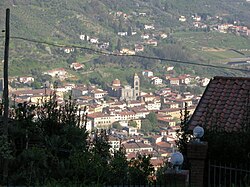Pescia
| Pescia | ||
|---|---|---|
| Comune | ||
| Comune di Pescia | ||
 |
||
|
||
| Location of Pescia in Italy | ||
| Coordinates: 43°54′N 10°41.4′E / 43.900°N 10.6900°E | ||
| Country | Italy | |
| Region | Tuscany | |
| Province / Metropolitan city | Pistoia (PT) | |
| Frazioni | Medicina, Fibbialla, Aramo, San Quirico, Castelvecchio, Stiappa, Pontito, Sorana, Vellano, Pietrabuona, Collodi, Veneri, Chiodo | |
| Government | ||
| • Mayor | Roberta Marchi (since June 2009) | |
| Area | ||
| • Total | 79.18 km2 (30.57 sq mi) | |
| Elevation | 62 m (203 ft) | |
| Population (30 April 2010) | ||
| • Total | 19,780 | |
| • Density | 250/km2 (650/sq mi) | |
| Demonym(s) | Pesciatini | |
| Time zone | CET (UTC+1) | |
| • Summer (DST) | CEST (UTC+2) | |
| Postal code | 51017, 51012, 51010 | |
| Dialing code | 0572 | |
| Patron saint | St. Dorothea | |
| Saint day | 6 February | |
| Website | (Italian) Official website | |
Pescia (Italian pronunciation: [ˈpeʃʃa]) is an Italian city in the province of Pistoia, Tuscany, central Italy.
It is located in a central zone between the cities Lucca and Florence, on the banks of the homonymous river.
Archaeological excavations have suggested that the Lombards built the first settlement here on the river banks. The name of the city comes in fact from a Lombard word, meaning "river".
Lucca occupied and destroyed Pescia during the 13th century, but the town was quickly rebuilt. During the entire Middle Ages Florence and Lucca contended for the city, as the latter was located on the border between the two republics. In 1339, after almost ten years of war, Florence occupied it.
The economy of the town was founded on mulberry cultivation and silkworm breeding. Heavily struck by the Black Death, Pescia overcame the demographic and economical depression which had ensued only at the end of that century (15th century).
At the end of the 17th century the Grand-duke of Tuscany declared Pescia "City of the Grand Duchy of Tuscany". In the 19th century the silk production was so important that Pescia was called "the little Manchester of Tuscany". The economy of the town dropped after a commercial conflict between France and Italy (1888). The passage of Napoleon highly damaged the economy of the city, because he substituted silk with sugar beet.
Since 1925 Pesciatins found an alternative economic source in cultivating and trading flowers and olive plants (since the end of the 19th century). Bombardments during World War II caused much damage to Pescia.
...
Wikipedia


